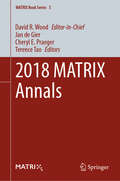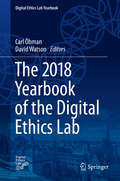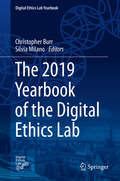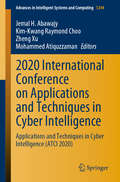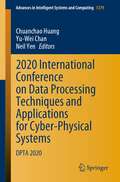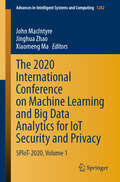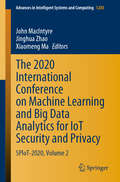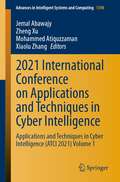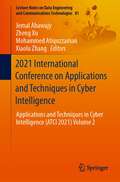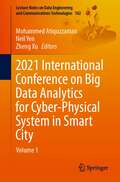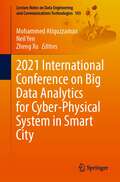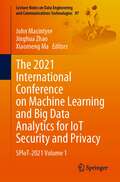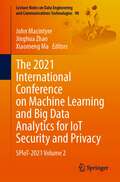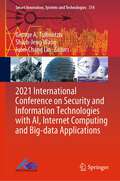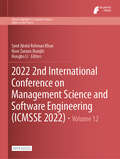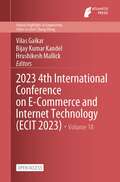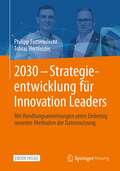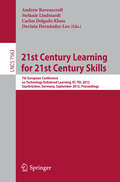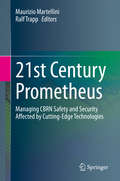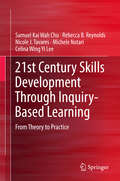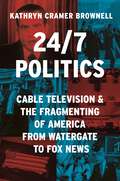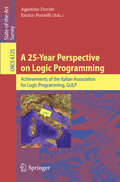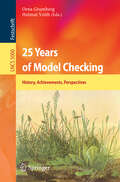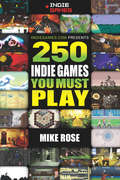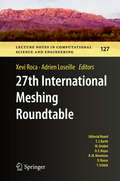- Table View
- List View
2018 MATRIX Annals (MATRIX Book Series #3)
by David R. WoodMATRIX is Australia’s international and residential mathematical research institute. It facilitates new collaborations and mathematical advances through intensive residential research programs, each 1-4 weeks in duration. This book is a scientific record of the eight programs held at MATRIX in 2018: - Non-Equilibrium Systems and Special Functions- Algebraic Geometry, Approximation and Optimisation- On the Frontiers of High Dimensional Computation- Month of Mathematical Biology- Dynamics, Foliations, and Geometry In Dimension 3- Recent Trends on Nonlinear PDEs of Elliptic and Parabolic Type- Functional Data Analysis and Beyond- Geometric and Categorical Representation Theory The articles are grouped into peer-reviewed contributions and other contributions. The peer-reviewed articles present original results or reviews on a topic related to the MATRIX program; the remaining contributions are predominantly lecture notes or short articles based on talks or activities at MATRIX.
The 2018 Yearbook of the Digital Ethics Lab (Digital Ethics Lab Yearbook #1)
by Carl Öhman David WatsonThis book explores a wide range of topics in digital ethics. It features 11 chapters that analyze the opportunities and the ethical challenges posed by digital innovation, delineate new approaches to solve them, and offer concrete guidance to harness the potential for good of digital technologies. The contributors are all members of the Digital Ethics Lab (the DELab), a research environment that draws on a wide range of academic traditions.The chapters highlight the inherently multidisciplinary nature of the subject, which cannot be separated from the epistemological foundations of the technologies themselves or the political implications of the requisite reforms. Coverage illustrates the importance of expert knowledge in the project of designing new reforms and political systems for the digital age. The contributions also show how this task requires a deep self-understanding of who we are as individuals and as a species.The questions raised here have ancient -- perhaps even timeless -- roots. The phenomena they address may be new. But, the contributors examine the fundamental concepts that undergird them: good and evil, justice and truth. Indeed, every epoch has its great challenges. The role of philosophy must be to redefine the meaning of these concepts in light of the particular challenges it faces. This is true also for the digital age. This book takes an important step towards redefining and re-implementing fundamental ethical concepts to this new era.
The 2019 Yearbook of the Digital Ethics Lab (Digital Ethics Lab Yearbook)
by Christopher Burr Silvia MilanoThis edited volume presents an overview of cutting-edge research areas within digital ethics as defined by the Digital Ethics Lab of the University of Oxford. It identifies new challenges and opportunities of influence in setting the research agenda in the field.The yearbook presents research on the following topics: conceptual metaphor theory, cybersecurity governance, cyber conflicts, anthropomorphism in AI, digital technologies for mental healthcare, data ethics in the asylum process, AI’s legitimacy and democratic deficit, digital afterlife industry, automatic prayer bots, foresight analysis and the future of AI. This volume appeals to students, researchers and professionals.
2020 International Conference on Applications and Techniques in Cyber Intelligence: Applications and Techniques in Cyber Intelligence (ATCI 2020) (Advances in Intelligent Systems and Computing #1244)
by Jemal H. Abawajy Kim-Kwang Raymond Choo Zheng Xu Mohammed AtiquzzamanThis book presents innovative ideas, cutting-edge findings, and novel techniques, methods, and applications in a broad range of cybersecurity and cyberthreat intelligence areas. As our society becomes smarter, there is a corresponding need to secure our cyberfuture. The book describes approaches and findings that are of interest to business professionals and governments seeking to secure our data and underpin infrastructures, as well as to individual users.
2020 International Conference on Data Processing Techniques and Applications for Cyber-Physical Systems: DPTA 2020 (Advances in Intelligent Systems and Computing #1379)
by Chuanchao Huang Yu-Wei Chan Neil YenThis book covers cutting-edge and advanced research on data processing techniques and applications for cyber-physical systems, gathering the proceedings of the International Conference on Data Processing Techniques and Applications for Cyber-Physical Systems (DPTA 2020), held in Laibin City, Guangxi Province, China, on December 11–12, 2020. It examines a wide range of topics, including distributed processing for sensor data in CPS networks; approximate reasoning and pattern recognition for CPS networks; data platforms for efficient integration with CPS networks; machine learning algorithms for CPS networks; and data security and privacy in CPS networks. Outlining promising future research directions, the book offers a valuable resource for students, researchers, and professionals alike, while also providing a useful reference guide for newcomers to the field.
The 2020 International Conference on Machine Learning and Big Data Analytics for IoT Security and Privacy: SPIoT-2020, Volume 1 (Advances in Intelligent Systems and Computing #1282)
by John MacIntyre Jinghua Zhao Xiaomeng MaThis book presents the proceedings of The 2020 International Conference on Machine Learning and Big Data Analytics for IoT Security and Privacy (SPIoT-2020), held in Shanghai, China, on November 6, 2020. Due to the COVID-19 outbreak problem, SPIoT-2020 conference was held online by Tencent Meeting. It provides comprehensive coverage of the latest advances and trends in information technology, science and engineering, addressing a number of broad themes, including novel machine learning and big data analytics methods for IoT security, data mining and statistical modelling for the secure IoT and machine learning-based security detecting protocols, which inspire the development of IoT security and privacy technologies. The contributions cover a wide range of topics: analytics and machine learning applications to IoT security; data-based metrics and risk assessment approaches for IoT; data confidentiality and privacy in IoT; and authentication and access control for data usage in IoT. Outlining promising future research directions, the book is a valuable resource for students, researchers and professionals and provides a useful reference guide for newcomers to the IoT security and privacy field.
The 2020 International Conference on Machine Learning and Big Data Analytics for IoT Security and Privacy: SPIoT-2020, Volume 2 (Advances in Intelligent Systems and Computing #1283)
by John MacIntyre Jinghua Zhao Xiaomeng MaThis book presents the proceedings of The 2020 International Conference on Machine Learning and Big Data Analytics for IoT Security and Privacy (SPIoT-2020), held in Shanghai, China, on November 6, 2020. Due to the COVID-19 outbreak problem, SPIoT-2020 conference was held online by Tencent Meeting. It provides comprehensive coverage of the latest advances and trends in information technology, science and engineering, addressing a number of broad themes, including novel machine learning and big data analytics methods for IoT security, data mining and statistical modelling for the secure IoT and machine learning-based security detecting protocols, which inspire the development of IoT security and privacy technologies. The contributions cover a wide range of topics: analytics and machine learning applications to IoT security; data-based metrics and risk assessment approaches for IoT; data confidentiality and privacy in IoT; and authentication and access control for data usage in IoT. Outlining promising future research directions, the book is a valuable resource for students, researchers and professionals and provides a useful reference guide for newcomers to the IoT security and privacy field.
2021 International Conference on Applications and Techniques in Cyber Intelligence: Applications and Techniques in Cyber Intelligence (ATCI 2021) Volume 1 (Advances in Intelligent Systems and Computing #1398)
by Jemal Abawajy Zheng Xu Mohammed Atiquzzaman Xiaolu ZhangThis book presents innovative ideas, cutting-edge findings, and novel techniques, methods, and applications in a broad range of cybersecurity and cyberthreat intelligence areas. As our society becomes smarter, there is a corresponding need to secure our cyberfuture. The book describes approaches and findings that are of interest to business professionals and governments seeking to secure our data and underpin infrastructures, as well as to individual users.
2021 International Conference on Applications and Techniques in Cyber Intelligence: Applications and Techniques in Cyber Intelligence (ATCI 2021) Volume 2 (Lecture Notes on Data Engineering and Communications Technologies #81)
by Jemal Abawajy Zheng Xu Mohammed Atiquzzaman Xiaolu ZhangThis book presents innovative ideas, cutting-edge findings, and novel techniques, methods, and applications in a broad range of cybersecurity and cyberthreat intelligence areas. As our society becomes smarter, there is a corresponding need to secure our cyberfuture. The book describes approaches and findings that are of interest to business professionals and governments seeking to secure our data and underpin infrastructures, as well as to individual users. 1. Highlights recent applications and techniques in cyber intelligence2. Includes the proceedings of the 2021 International Conference on Applications and Techniques in Cyber Intelligence (ATCI 2021) 3. Presents a broad range of scientific research on cyber intelligence
2021 International Conference on Big Data Analytics for Cyber-Physical System in Smart City: Volume 1 (Lecture Notes on Data Engineering and Communications Technologies #102)
by Mohammed Atiquzzaman Neil Yen Zheng XuThis book gathers a selection of peer-reviewed papers presented at the third Big Data Analytics for Cyber-Physical System in Smart City (BDCPS 2021) conference, held in Shanghai, China, on Nov. 27, 2021. The contributions, prepared by an international team of scientists and engineers, cover the latest advances made in the field of machine learning, and big data analytics methods and approaches for the data-driven co-design of communication, computing, and control for smart cities. Given its scope, it offers a valuable resource for all researchers and professionals interested in big data, smart cities, and cyber-physical systems.
2021 International Conference on Big Data Analytics for Cyber-Physical System in Smart City: Volume 2 (Lecture Notes on Data Engineering and Communications Technologies #103)
by Mohammed Atiquzzaman Neil Yen Zheng XuThis book gathers a selection of peer-reviewed papers presented at the third Big Data Analytics for Cyber-Physical System in Smart City (BDCPS 2021) conference, held in Shanghai, China, on Nov. 27, 2021. The contributions, prepared by an international team of scientists and engineers, cover the latest advances made in the field of machine learning, and big data analytics methods and approaches for the data-driven co-design of communication, computing, and control for smart cities. Given its scope, it offers a valuable resource for all researchers and professionals interested in big data, smart cities, and cyber-physical systems.
The 2021 International Conference on Machine Learning and Big Data Analytics for IoT Security and Privacy: SPIoT-2021 Volume 1 (Lecture Notes on Data Engineering and Communications Technologies #97)
by John Macintyre Jinghua Zhao Xiaomeng MaThis book presents the proceedings of the 2020 2nd International Conference on Machine Learning and Big Data Analytics for IoT Security and Privacy (SPIoT-2021), online conference, on 30 October 2021. It provides comprehensive coverage of the latest advances and trends in information technology, science and engineering, addressing a number of broad themes, including novel machine learning and big data analytics methods for IoT security, data mining and statistical modelling for the secure IoT and machine learning-based security detecting protocols, which inspire the development of IoT security and privacy technologies. The contributions cover a wide range of topics: analytics and machine learning applications to IoT security; data-based metrics and risk assessment approaches for IoT; data confidentiality and privacy in IoT; and authentication and access control for data usage in IoT. Outlining promising future research directions, the book is a valuable resource for students, researchers and professionals and provides a useful reference guide for newcomers to the IoT security and privacy field.
The 2021 International Conference on Machine Learning and Big Data Analytics for IoT Security and Privacy: SPIoT-2021 Volume 2 (Lecture Notes on Data Engineering and Communications Technologies #98)
by John Macintyre Jinghua Zhao Xiaomeng MaThis book presents the proceedings of the 2020 2nd International Conference on Machine Learning and Big Data Analytics for IoT Security and Privacy (SPIoT-2021), online conference, on 30 October 2021. It provides comprehensive coverage of the latest advances and trends in information technology, science and engineering, addressing a number of broad themes, including novel machine learning and big data analytics methods for IoT security, data mining and statistical modelling for the secure IoT and machine learning-based security detecting protocols, which inspire the development of IoT security and privacy technologies. The contributions cover a wide range of topics: analytics and machine learning applications to IoT security; data-based metrics and risk assessment approaches for IoT; data confidentiality and privacy in IoT; and authentication and access control for data usage in IoT. Outlining promising future research directions, the book is a valuable resource for students, researchers and professionals and provides a useful reference guide for newcomers to the IoT security and privacy field.
2021 International Conference on Security and Information Technologies with AI, Internet Computing and Big-data Applications (Smart Innovation, Systems and Technologies #314)
by George A. Tsihrintzis Shiuh-Jeng Wang Iuon-Chang LinThis book aims to attract researchers and practitioners who are working in information technology and computer science. This edited book is about basics and high-level concepts regarding blockchain technology and application, multimedia security, information processing, security of network, cloud and IoT, cryptography and information hiding, cyber-security and evidence investigations, and learning and intelligent computing. It is becoming increasingly important to develop adaptive, intelligent computing-centric, energy-aware, secure, and privacy-aware mechanisms in high-performance computing and IoT applications. The book serves as a useful guide for industry persons and also helps beginners to learn things from basic to advance in the area of better computing paradigm. Our aim is intended to provide a platform for researchers, engineers, academicians as well as industrial professionals from all over the world to present their research results in security-related areas. We believe that this book not only presents novel and interesting ideas but also will stimulate interesting discussions from the participants and inspire new ideas.
2022 2nd International Conference on Management Science and Software Engineering (Atlantis Highlights in Computer Sciences #12)
This is an open access book.Management science and engineering is a systematic discipline that combines modern information technology and digital technology, and then uses some related discipline methods, such as systems science, mathematical science, economics and behavioral science, and engineering methods. After analyzing and researching some problems arising from social economy, engineering, education, finance, etc., and making corresponding countermeasures. The main purpose is to achieve control and planning, decision-making and adjustment in social, economic, education, engineering and other aspects, and then make improvements, and finally organize and coordinate. The relevant departments can be combined to achieve system management, so that the allocation of resources and the Management can be rationally optimized, so that individual functions can play the greatest role, minimize resource consumption, and maximize the optimal allocation of resources. This is also the ultimate research purpose.Liangliang Wang said:" Management is the productive force, which promotes the development of the country, society and enterprise. The relationship between management practice and management science is the relationship between theory and practice. The research on management science helps to improve the level of management, and then promote the development of the country, society and enterprises. On the other hand, management practice changes with the continuous progress of the times. It is necessary to study the current situation and trend of management science in the new era, which will help to clarify the future development direction of the discipline and discover the deficiencies in management scientific research and grasp it. The focus of management science research, thereby promoting research in management science."Therefore, it is necessary to create a space for management science practitioners, engineering practitioners, researchers and related enthusiasts to gather and discuss this current issue.The 2nd International Conference on Management Science and Software Engineering (ICMSSE 2022) aims to accommodate this need, as well as to:1. provide a platform for experts and scholars, engineers and technicians in the field of management and software engineering to share scientific research achievements and cutting-edge technologies2. understand academic development trends, broaden research ideas, strengthen academic research and discussion, and promote the industrialization cooperation of academic achievements3. Promote the institutionalization and standardization of management science through modern researchThe conference will focus on software processing and information systems, combining research directions in the field of management. ICMSSE International Conference on Management Science and Software Engineering welcomes papers dealing with management systems research, software programming, management systems optimization, information systems management, etc.The 2nd International Conference on Management Science and Software Engineering (ICMSSE 2022) will be held in Chongqing on July 15-17, 2022. The conference sincerely invites experts, scholars, business people and other relevant personnel from domestic and foreign universities, research institutions to participate in the exchange.
2023 4th International Conference on E-Commerce and Internet Technology (Atlantis Highlights in Engineering #18)
by Vilas Gaikar Bijay Kumar Kandel Hrushikesh MallickThis is an open access book.E-commerce is a commercial activity centered on commodity exchange by means of information network technology. In the open network environment of the Internet, based on the client/server application method, buyers and sellers carry out various commercial activities online, realizing online shopping for consumers, online transactions between merchants and online electronic payment, as well as various business activities, trading activities, financial activities and related comprehensive service activities of a new business operation mode. It is the electronicization, networking and informatization of all aspects of traditional business activities.Internet technology is the prerequisite for e-commerce to be realized. The development and popularization of Internet technology has also played a positive role in promoting the development of e-commerce. Internet technology is a double-edged sword, with advantages and disadvantages, since it can promote the development of e-commerce, it may also affect its normal construction, such as the existence of theft of information, tampering with information, counterfeiting, malicious damage and other security risks, but also through the firewall technology, data encryption technology, authentication technology, digital signature technology and other technologies to regulate the transaction process.Therefore, the influence of the two is mutual, and only through continuous friction can we continuously promote the development of both sides in a benign direction.ECIT 2023 provides a platform in order toCreate a forum for sharing, research and exchange at the international level, so that participants can be informed of the latest research directions, results and contents of applied Internet technologies on e-commerce, thus stimulating them to generate new research ideas.Promote the development of e-commerce by studying its problems.To open up new perspectives, broaden horizons and examine the issues under discussion by the participants.Each accepted article requires at least one author to attend the meeting and present it.
2030 - Strategieentwicklung für Innovation Leaders: Mit Handlungsanweisungen unter Einbezug neuester Methoden der Datennutzung
by Philipp Futterknecht Tobias HertfelderSeit der Relativitätstheorie wissen wir, dass massereiche Objekte durch ihre Gravitation Dinge anziehen. Je größer die Masse desto größer ist auch die Anziehungskraft. Genauso verhält es sich auch in Strategieprojekten. Jeder Projektteilnehmer ist dabei ein massereicher Teilnehmer und hat Auswirkungen auf das Zusammenspiel. Was sich gravierend geändert hat ist der Einfluss der Daten auf diesen Prozess. Wer dies nicht berücksichtigt, wird in Zukunft enorme Einbußen hinnehmen müssen. Da sich durch diese Veränderung ein neues Gleichgewicht einstellt, ändern sich auch die Erfolgsaussichten der angewandten Methoden und Verhaltensweisen. Wie Sie diesen Wandel meistern können und was Sie dazu benötigen erfahren Sie in diesem Buch.
21st Century Learning for 21st Century Skills: 7th European Conference on Technology Enhanced Learning, EC-TEL 2012, Saarbrücken, Germany, September 18-21, 2012, Proceedings (Lecture Notes in Computer Science #7563)
by Andrew Ravenscroft Stefanie Lindstaedt Carlos Delgado Kloos Davinia Hernández-LeoThis book constitutes the refereed proceedings of the 7th European Conference on Technology Enhanced Learning, EC-TEL 2012, held in Saarbrücken, Germany, in September 2012. The 26 revised full papers presented were carefully reviewed and selected from 130 submissions. The book also includes 12 short papers, 16 demonstration papers, 11 poster papers, and 1 invited paper. Specifically, the programme and organizing structure was formed through the themes: mobile learning and context; serious and educational games; collaborative learning; organisational and workplace learning; learning analytics and retrieval; personalised and adaptive learning; learning environments; academic learning and context; and, learning facilitation by semantic means.
21st Century Prometheus: Managing CBRN Safety and Security Affected by Cutting-Edge Technologies
by Maurizio Martellini Ralf TrappThis book describes the evolving CBRN risk landscape and highlights advances in the “core” CBRN technologies, including when combined with (improvised) explosive devices (CBRNe threats). It analyses how associated technologies create new safety and security risks, challenging certain assumptions that underlie current control regimes. The book also shows how technologies can be enablers for more effective strategies to mitigate these risks.21st-century safety and security risks emanating from chemical, biological, radiological and nuclear materials – whether resulting from natural events, accidents or malevolent use - are increasingly shaped by technologies that enable their development, production or use in ways that differ from the past. Artificial intelligence, the use of cyberspace, the revolution in the life sciences, new manufacturing methods, new platforms and equipment for agent delivery, hypersonic weapons systems, information tools utilised in hybrid warfare – these and other technologies are reshaping the global security environment and CBRN landscape. They are leading to a growing potential for highly targeted violence, and they can lead to greater instability and vulnerability worldwide. At the same time, technology offers solutions to manage CBRN risks. Examples are faster detection, more accurate characterisation of the nature and origin of CBRN agents, new forensic investigation methods, or new medical treatments for victims of CBRN incidents. New educational concepts help to foster a culture of responsibility in science and technology and strengthen governance. New training methods help develop practical skills to manage CBRN risks more effectively.The book concludes that there is a growing need for a holistic framework towards CBRN risk mitigation. Traditional arms control mechanisms such as global, regional or bilateral treaties and export controls are still needed, as they provide a necessary legal and institutional framework. But laws and technology denial alone will not suffice, and institutional mechanisms can at times be weak. Given the pace of technological progress and the diffusion of critical knowledge, tools and materials, policymakers must accept that CBRN risks cannot be eliminated altogether. Instead, society has to learn to manage these risks and develop resilience against them. This requires a “softer”, broadly based multi-stakeholder approach involving governments, industry, the research and development communities, educators, and civil society. Furthermore, educating policymakers that cutting-edge technologies may seriously affect global strategic stability could create incentives for developing a more creative and contemporary arms control strategy that fosters cooperation rather than incremental polarisation.
21st Century Skills Development Through Inquiry-Based Learning: From Theory to Practice
by Samuel Kai Chu Rebecca B. Reynolds Nicole J. Tavares Michele Notari Celina Wing LeeThis book presents innovative instructional interventions designed to support inquiry project-based learning as an approach to equip students with 21st century skills. Instructional techniques include collaborative team-based teaching, social constructivist game design and game play, and productive uses of social media such as wikis and other online communication affordances. The book will be of interest to researchers seeking a summary of recent empirical studies in the inquiry project-based learning domain that employ new technologies as constructive media for student synthesis and creation. The book also bridges the gap between empirical works and a range of national- and international-level educational standards frameworks such as the P21, the OECD framework, AASL Standards for the 21st Century Learner, and the Common Core State Standards in the US. Of particular interest to education practitioners, the book offers detailed descriptions of inquiry project-based learning interventions that can be directly reproduced in today's schools. Further, the book provides research-driven guidelines for the evaluation of student inquiry project-based learning. Lastly, it offers education policymakers insight into establishing anchors and spaces for applying inquiry project-based learning opportunities for youth today in the context of existing and current education reform efforts. The aim of this book is to support education leaders', practitioners' and researchers' efforts in advancing inspiring and motivating student learning through transformative social constructivist inquiry-based knowledge-building with information technologies. We propose that preparing students with inquiry mindsets and dispositions can promote greater agency, critical thinking and resourcefulness, qualities needed for addressing the complex societal challenges they may face.
24/7 Politics: Cable Television and the Fragmenting of America from Watergate to Fox News (Politics and Society in Modern America #148)
by Kathryn Cramer BrownellHow cable television upended American political life in the pursuit of profits and influenceAs television began to overtake the political landscape in the 1960s, network broadcast companies, bolstered by powerful lobbying interests, dominated screens across the nation. Yet over the next three decades, the expansion of a different technology, cable, changed all of this. 24/7 Politics tells the story of how the cable industry worked with political leaders to create an entirely new approach to television, one that tethered politics to profits and divided and distracted Americans by feeding their appetite for entertainment—frequently at the expense of fostering responsible citizenship.In this timely and provocative book, Kathryn Cramer Brownell argues that cable television itself is not to blame for today’s rampant polarization and scandal politics—the intentional restructuring of television as a political institution is. She describes how cable innovations—from C-SPAN coverage of congressional debates in the 1980s to MTV’s foray into presidential politics in the 1990s—took on network broadcasting using market forces, giving rise to a more decentralized media world. Brownell shows how cable became an unstoppable medium for political communication that prioritized cult followings and loyalty to individual brands, fundamentally reshaped party politics, and, in the process, sowed the seeds of democratic upheaval.24/7 Politics reveals how cable TV created new possibilities for antiestablishment voices and opened a pathway to political prominence for seemingly unlikely figures like Donald Trump by playing to narrow audiences and cultivating division instead of common ground.
A 25-Year Perspective on Logic Programming: Achievements of the Italian Association for Logic Programming, GULP (Lecture Notes in Computer Science #6125)
by Agostino Dovier Enrico PontelliThis book celebratesthe 25th anniversaryof GULP—the Italian Associationfor LogicProgramming.Authored by Italian researchersat the leading edge of their ?elds, it presents an up-to-date survey of a broad collection of topics in logic programming, making it a useful reference for both researchers and students. During its 25-year existence, GULP has organised a wide range of national and international activities, including both conferences and summer schools. It has been especially active in supporting and encouraging young researchers, by providing scholarships for GULP events and awarding distinguished disser- tions. WeintheinternationallogicprogrammingcommunitylookuponGULPwith a combination of envy, admiration and gratitude. We are pleased to attend its conferences and summer schools, where we can learn about scienti?c advances, catch up with old friends and meet young students. It is an honour for me to acknowledge our appreciation to GULP for its outstanding contributions to our ?eld and to express our best wishes for its continuing prosperity in the future. March 2010 Robert Kowalski Imperial College London Preface On June 18, 1985, a group of pioneering researchers, including representatives from industry, national research labs, and academia, attended the constituent assembly of the Group of researchers and Users of Logic Programming (GULP) association. That was the starting point of a long adventure in science, that 1 we are still experiencing 25 years later. This volume celebrates this important event.
25 Years of Model Checking: History, Achievements, Perspectives (Lecture Notes in Computer Science #5000)
by Orna Grumberg Helmut VeithModel checking technology is among the foremost applications of logic to computer science and computer engineering. The model checking community has achieved many breakthroughs, bridging the gap between theoretical computer science and hardware and software engineering, and it is reaching out to new challenging areas such as system biology and hybrid systems. Model checking is extensively used in the hardware industry and has also been applied to the verification of many types of software. Model checking has been introduced into computer science and electrical engineering curricula at universities worldwide and has become a universal tool for the analysis of systems. This Festschrift volume, published in celebration of the 25th Anniversary of Model Checking, includes a collection of 11 invited papers based on talks at the symposium "25 Years of Model Checking", 25MC, which was part of the 18th International Conference on Computer Aided Verification (CAV 2006), which in turn was part of the Federated Logic Conference (FLoC 2006) held in Seattle, WA, USA, in August 2006. Model checking is currently attracting considerable attention beyond the core technical community, and the ACM Turing Award 2007 was given in recognition of the paradigm-shifting work on this topic initiated a quarter century ago. Here we honor that achievement with the inclusion of facsimile reprints of the visionary papers on model checking by Edmund Clarke and Allen Emerson, and by Jean-Pierre Queille and Joseph Sifakis.
250 Indie Games You Must Play
by Mike RoseThis book is a guide to the expanding world of indie gaming. It helps readers to understand why indie games are so important to so many people in the entertainment industry. The book covers puzzlers, platformers, beat 'em ups, shoot 'em ups, role-playing, and strategy.
27th International Meshing Roundtable (Lecture Notes in Computational Science and Engineering #127)
by Xevi Roca Adrien LoseilleThe International Meshing Roundtable (IMR) brings together researchers, developers, and application experts in a variety of disciplines, from all over the world, to present and discuss ideas on mesh generation and related topics. The technical papers in this volume present theoretical and novel ideas and algorithms with practical potential, as well as technical applications in science and engineering, geometric modelling, computer graphics, and visualization.
